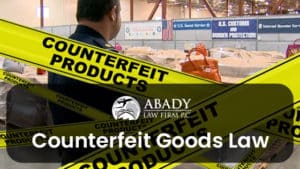There’s a good chance you’ve come across counterfeit goods at some point in your life.
Maybe you purchase a pair of AirPods thinking they’re real, but they turned out to be fake. Or you purchased a pair of Nike shoes, only to find out they are fake, later on.
Counterfeit goods are found vastly around the world nowadays. From electronic goods to car parts, from clothing items to toys, from medicines to drugs — counterfeits are found everywhere.
Counterfeit goods are often considered more “dangerous” than knock-off products. That’s right, both of these are different. (More on that, later)
In this article, we dive deeper into this topic; counterfeit goods; what they are; what are the laws for them; who monitors them; whether you should buy them.
Let’s get started.
WHAT ARE COUNTERFEIT GOODS?
Simply put, counterfeit goods are fake products, sold under the name of another, usually more reputed brand.
For instance, there are tons of fake iPhones that you can purchase from Chinese stores. These phones are labeled “iPhones” and are built just like the real thing, but when you start using them, you will know for sure they’re fake.
Knock-offs are different in the way that they don’t have the real item’s branding on them. For instance, a knock-off iPhone may be labeled “iFone”, “eyePhone”, or anything else similar to that, but it won’t have the real name and branding on it.
A counterfeit iPhone, on the other hand, will have the real Apple logo and product name on it. Counterfeit goods are purposely made with the original name and branding, so buyers can be tricked into purchasing them.
WHAT ARE THE RULES AND REGULATIONS AROUND USING, IMPORTING, AND EXPORTING COUNTERFEIT GOODS?
The U.S. government has strict policies when it comes to the movement of counterfeit goods.
If someone is found importing counterfeit goods, they can be imprisoned for 10 years, accompanied by a $2 million fine. This penalty is for first-time offenders. If someone breaks the law for the second time, they will be imprisoned for 20 years, coupled with a $5 million fine.
If an organization is caught trafficking in counterfeit goods, the penalty is even higher. Such an organization may be punished with a hefty fine of $15 million.
CAN I PURCHASE COUNTERFEIT GOODS ON PURPOSE?
Yes, you can.
There’s no law when it comes to the purchase of counterfeit products for personal use. For instance, if you don’t have the budget to purchase a real pair of Nike sneakers, you can go on and purchase a counterfeit pair for a cheaper price. You won’t be penalized or punished for purchasing it.
However, that doesn’t mean you should support counterfeit goods. There are many negative implications of purchasing counterfeit goods.
WHY YOU SHOULDN’T BUY COUNTERFEIT GOODS
First and foremost, you must be aware that counterfeit goods are imported into the country illegally. So, if you purchase such a good, you’re indirectly getting involved in the business promotion of the violating company. The fraudulent company is consuming the profit of a real, legitimate company, and you’re being a part of this act unknowingly.
Furthermore, counterfeit goods don’t have the same quality control checks as real products, often leading to dangerous outcomes.
For instance, a counterfeit iPhone may have an unsafe battery, which may catch fire, or even explode under extreme circumstances.
Furthermore, if the counterfeit product is related to food, drugs, and the medicinal industry, it may have many negative implications on your health. Consumption of counterfeit foods, medicines, and drinks is strictly discouraged.
THE ROLE OF U.S. CUSTOMS AND BORDER PROTECTION
U.S. Customs and Border Protection is an agency that stops the import and export of prohibited items in and out of the country.
As exchanging counterfeit goods is prohibited by law, CBP is also responsible for screening potential counterfeit products.
WHAT TO DO IF YOU’RE HAVING ISSUES WITH COUNTERFEIT GOODS?
If CBP finds a package that may contain counterfeit goods, it can take control of the package until the products are proven to be real.
If CBP seized your package, thinking it contains counterfeit products, even when it doesn’t — you will have to file a petition to get your package released.
You will have to be quick and file a petition within 30 days of your package getting seized, otherwise, you won’t be able to get it released.
The best way to go about the situation is to hire a reputed customs law firm to prepare and file the petition for you. Relying on a reputed, high-quality firm will ensure you have the maximum chances of getting your package released.
Conclusion
Rules and regulations regarding counterfeit products are strict in the U.S. That’s why you should never rely on an unprofessional law firm when dealing with such a sensitive issue.
Abady Law Firm is a well-reputed name when it comes to dealing with legal matters of importing and exporting. If you’re having problems with your cargo, consider getting in touch with Abady Law Firm by clicking here.


